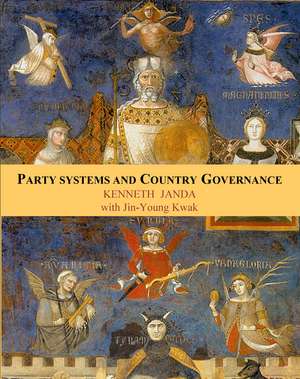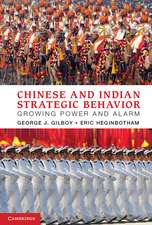Party Systems and Country Governance
Autor Kenneth Janda, Jin-Young Kwaken Limba Engleză Hardback – 30 apr 2011
| Toate formatele și edițiile | Preț | Express |
|---|---|---|
| Paperback (1) | 297.62 lei 6-8 săpt. | |
| Taylor & Francis – 30 aug 2011 | 297.62 lei 6-8 săpt. | |
| Hardback (1) | 875.55 lei 6-8 săpt. | |
| Taylor & Francis – 30 apr 2011 | 875.55 lei 6-8 săpt. |
Preț: 875.55 lei
Preț vechi: 1215.83 lei
-28% Nou
Puncte Express: 1313
Preț estimativ în valută:
167.59€ • 182.10$ • 140.87£
167.59€ • 182.10$ • 140.87£
Carte tipărită la comandă
Livrare economică 21 aprilie-05 mai
Preluare comenzi: 021 569.72.76
Specificații
ISBN-13: 9781594519321
ISBN-10: 1594519323
Pagini: 256
Dimensiuni: 152 x 229 x 20 mm
Greutate: 0.45 kg
Ediția:1
Editura: Taylor & Francis
Colecția Routledge
Locul publicării:Oxford, United Kingdom
ISBN-10: 1594519323
Pagini: 256
Dimensiuni: 152 x 229 x 20 mm
Greutate: 0.45 kg
Ediția:1
Editura: Taylor & Francis
Colecția Routledge
Locul publicării:Oxford, United Kingdom
Recenzii
“Party Systems and Country Governance provides a sophisticated development of the concept of
country governance, a long-needed clarification of the meaning of the party system, and a systematic
investigation of the relationship between the two. Thanks to the incorporation, en passant, of a
friendly and entirely accessible introduction to the uses of theory and statistical analysis in political
science, the book is a delight to read. I enthusiastically recommend it to students and party scholars
at all levels. A masterful accomplishment.”
—Kay Lawson, San Francisco State University
“An empirically nuanced and tightly reasoned analysis of the complicated relationship between
the vitality and contributions of political party systems to the quality, competence, and democratic
relevance of a country’s governance. . . .All in all, quite an impressive intellectual achievement and,
given the nature of the problem addressed, a landmark study in the field.”
—William Crotty, Northeastern University
“A rare book in that it provides both cutting-edge original research and an excellent primer in
quantitative analysis. It has great potential for teaching undergraduates about hypothesis formation
and testing, measurement issues, and statistics. And it delivers all this while shedding light on a
fundamentally important question about the about the quality of governance.”
—Paul Webb, University of Sussex, UK
“Governance is discussed frequently, but it is analyzed in a rigorous and robust manner all too infrequently.
Kenneth Janda and Jin-Young Kwak have provided one of the more comprehensive and enlightening attempts to measure governance and to relate its success and failure to political factors. This short book is crucial reading for academics and for practitioners of the arts of governance.”
—B. Guy Peters, University of Pittsburgh
“This in-depth study of the role played by party systems across the world in the quality of governmental
performance by nation-states fills a gap in existing knowledge of this important concern and makes significant contributions to the conceptualization and measurement of country governance. The book will no doubt become an important source and an essential reference point for
future studies.”
—Anatoly Kulik, Russian Academy of Sciences
“Authors Janda and Kwak provide an examination of the inner workings of political party systems and country governance. The authors begin by defining the concept of country governance and how it is measured, and follow with discussions of environmental and party system effects on governance. The book contains numerous tables and graphs and extensive end-of-chapter notes.” --Eithne O’Leyne, August 2011 Reference and Research Book News
country governance, a long-needed clarification of the meaning of the party system, and a systematic
investigation of the relationship between the two. Thanks to the incorporation, en passant, of a
friendly and entirely accessible introduction to the uses of theory and statistical analysis in political
science, the book is a delight to read. I enthusiastically recommend it to students and party scholars
at all levels. A masterful accomplishment.”
—Kay Lawson, San Francisco State University
“An empirically nuanced and tightly reasoned analysis of the complicated relationship between
the vitality and contributions of political party systems to the quality, competence, and democratic
relevance of a country’s governance. . . .All in all, quite an impressive intellectual achievement and,
given the nature of the problem addressed, a landmark study in the field.”
—William Crotty, Northeastern University
“A rare book in that it provides both cutting-edge original research and an excellent primer in
quantitative analysis. It has great potential for teaching undergraduates about hypothesis formation
and testing, measurement issues, and statistics. And it delivers all this while shedding light on a
fundamentally important question about the about the quality of governance.”
—Paul Webb, University of Sussex, UK
“Governance is discussed frequently, but it is analyzed in a rigorous and robust manner all too infrequently.
Kenneth Janda and Jin-Young Kwak have provided one of the more comprehensive and enlightening attempts to measure governance and to relate its success and failure to political factors. This short book is crucial reading for academics and for practitioners of the arts of governance.”
—B. Guy Peters, University of Pittsburgh
“This in-depth study of the role played by party systems across the world in the quality of governmental
performance by nation-states fills a gap in existing knowledge of this important concern and makes significant contributions to the conceptualization and measurement of country governance. The book will no doubt become an important source and an essential reference point for
future studies.”
—Anatoly Kulik, Russian Academy of Sciences
“Authors Janda and Kwak provide an examination of the inner workings of political party systems and country governance. The authors begin by defining the concept of country governance and how it is measured, and follow with discussions of environmental and party system effects on governance. The book contains numerous tables and graphs and extensive end-of-chapter notes.” --Eithne O’Leyne, August 2011 Reference and Research Book News
Cuprins
Part I The Nature of Country Governance; Chapter 1 Governance: From Quaint Term to Hot Topic; Chapter 2 Science and Art in Measuring Country Governance; Part II Environmental Effects on Country Governance; Chapter 3 Country Governance: Chicken or Egg?; Chapter 4 The Effects of Country Size; Chapter 5 The Effects of Country Wealth; Part III Party System Effects on Country Governance; Chapter 6 Party Systems Effects: The Theory, Jin-Young Kwak; Chapter 7 Party Systems: Data and Measures, Jin-Young Kwak; Chapter 8 Governance Without Party Systems; Chapter 9 The Effects of Competition; Chapter 10 The Effects of Aggregation; Chapter 11 The Effects of Aggregation; Chapter 12 Reviewing the Theory and Research;
Descriere
Based on analysis of political party systems in 212 countries, the authors provide a range of invaluable insights into how to build good governance.
















